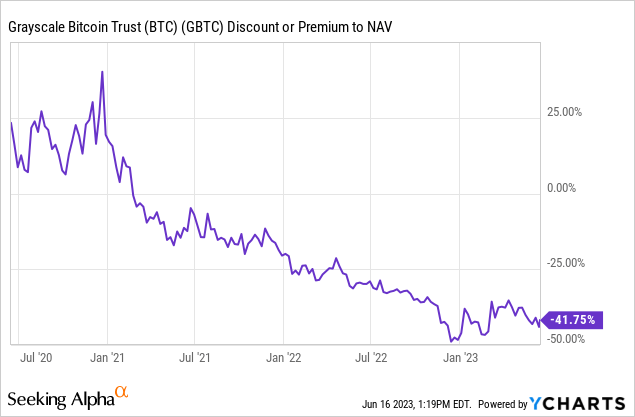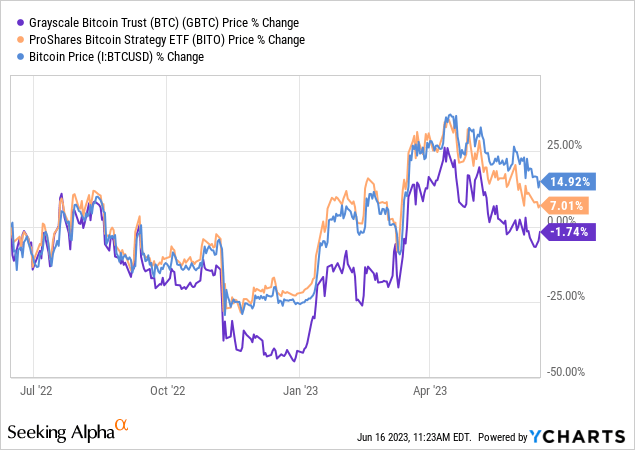24K-Production/iStock Editorial via Getty Images
There could soon be more investment money flowing into Bitcoin (BTC-USD) after all. Despite the investment fund outflow problem that has been plaguing the entire cryptocurrency landscape recently, BlackRock (BLK) apparently sees an opportunity in the market after filing for a United States listed Bitcoin ETF on June 15th. This is, frankly, an interesting development given the current war between the US Securities and Exchange Commission and the broader cryptocurrency industry.
According to the application filing, BlackRock’s ETF would be called the iShares Bitcoin Trust and use Coinbase (COIN) to custody the Bitcoin that is held for investors. The pricing reference rate for the underlying assets will come from CF Benchmark, which is a subsidiary of crypto exchange Kraken. Both Kraken and Coinbase have had recent run-ins with the SEC. Through the Trust, BlackRock would issue 40,000 share baskets on a continuous basis. Redemption would not be allowed on an individual share basis. However, full baskets of 40,000 shares could be redeemed by authorized participants.
Bitcoin and spot ETFs, a troubled history
The BlackRock application is significant because there isn’t currently a spot Bitcoin ETF in the United States. However, no US-based spot BTC product isn’t from a lack of trying. The SEC has somewhat notoriously denied every single spot Bitcoin ETF application to date; of which, there have been well over a dozen. Van Eck, WisdomTree, Ark 21Shares, Global X, NYDIG, and Grayscale have all had spot applications denied in recent years. In many cases, these firms have endured multiple denials.
The SEC’s negative stance on spot ETFs has generally been attributed to what the agency claims to be a lack of investor protections and manipulation concerns. Spot ETFs are available elsewhere, however. For instance, Canadian investors have the Purpose Bitcoin ETF (BTCC:CA). To this point, the SEC has only allowed Bitcoin futures ETFs like the ProShares Bitcoin Strategy ETF (BITO) in the United States. BITO is a fundamentally different product from spot ETFs because it uses short-dated contracts for Bitcoin exposure rather than holding the asset directly.
GBTC shareholders could end up the real winners
The biggest Bitcoin investment instrument in the United States by AUM is the Grayscale Bitcoin Trust (GBTC). GBTC launched in 2013 and has traded domestically through the OTC markets. That fund currently has nearly $16 billion in BTC under management yet the market capitalization of the fund’s shares is trading at just over $9 billion due to what has been a painful trend in the fund’s price to net asset value:
After trading for many years at a significant premium to the fund’s NAV, shares shifted to a discount in 2021 and have fallen dramatically against the underlying asset ever since. At one point near the end of 2022, GBTC shares closed at just under a 49% discount to NAV. While the discount has recovered to a less horrid 42% as of article submission, GBTC shares are still underperforming both the BITO futures ETF shares and the underlying asset over the last 12 months:
The company has made various attempts to right the ship, including applying to convert shares to an ETF. However, Grayscale’s application to convert the fund was denied by the SEC last year. As a result of that denial, Grayscale sued the SEC and claimed the agency was being “arbitrary, capricious, and discriminatory.” Grayscale further claimed the SEC was using flawed logic for the denial. One of the ongoing speculations within the market has been that GBTC shares would revert back much closer to net asset value if the fund was allowed to convert to an ETF and offer redemption of shares for the underlying asset.
Even with a high minimum threshold for redemption, the ability to redeem GBTC shares for the underlying asset would figure to trigger a dramatic repricing higher in GBTC as arbitragers buying Bitcoin at a 40% discount through GBTC shares could immediately redeem for the underlying and pocket the difference after taking delivery. Somewhat corroborating this thesis was the share price response to a panel of judges grilling the SEC’s attorneys at a March hearing. GBTC shares closed up more than 14% on a day when BTC was actually down in response to the judging panel questions.
Risks
There is certainly no guarantee BlackRock’s ETF application will be approved by the SEC. Gary Gensler appears to be making it his personal mission to keep as much traditional investor capital away from the crypto industry as possible. It seems unlikely in my view that BlackRock’s application will be approved. However, the mere fact that BlackRock has even submitted an application for a spot ETF is very telling. Despite the recent outflow issues, there is clearly investor interest in Bitcoin exposure, judging by Grayscale’s $16 billion AUM for GBTC.
Summary
In the unlikely event, BlackRock’s application actually is approved, it could be argued that Grayscale’s conversion application should be reconsidered and ultimately approved as well. I think even the slight possibility that BlackRock’s application could be approved makes GBTC shares a very worthwhile arbitrage play at current levels. It’s difficult for me to comprehend how the SEC could justify approving BlackRock after denying so many other firms. But it’s also difficult for me to comprehend why BlackRock would even try if the company didn’t internally believe their application had a shot.
From where I sit, the potential for a BlackRock spot ETF is a positive catalyst for BTC from a pure price per coin standpoint. The company has a monstrous $9.1 trillion in assets under management. If even just 0.1% of that wealth finds its way to BlackRock’s proposed spot ETF without cannibalizing other BTC investment funds, it would be a $9 billion bid on BTC. That bid would theoretically help GBTC share prices, even if the NAV discount stays exactly where it is.
Editor’s Note: This article discusses one or more securities that do not trade on a major U.S. exchange. Please be aware of the risks associated with these stocks.







